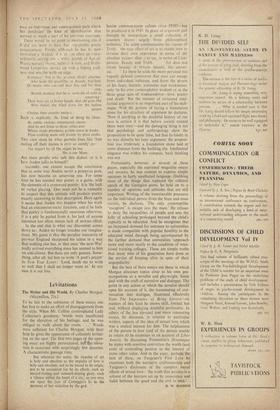LeS'itations
The Writer and His World. By Charles Morgan. (Macmillan, 21s.) To be fair to the substance of these essays one has first to make an effort of disengagement from the style. When Mr. Collins contemplated Lady Catherine's goodness, 'words were insufficient for the elevation of his feelings; and he was obliged to walk about the room. . . .' Words were sufficient for Charles Morgan; with their help he gives the appearance of delicately levitat- ing on the spot. The first two pages of the open- ing essay are highly perorational, btftlhe eleva- tion is sustained with surprisingly few descents. A characteristic passage runs, But whatever the name, the impulse of art is holy and absolute as the impulse of love is holy and absolute, not to be traced to its origin, not to be accounted for by its effects, such an inward-feeling and outward-shining glory, such a 'silence within the heart of a cry, as you may see upon the face of Correggio's Io in the moment of her visitation by the god.
Senior common-room culture circa 1910?—but he produced it in 1945. In place of argument and thought he manipulates a small collection of counters drawn largely from philosophical icsthetics. Ihe artist communicates his visions of Truth : -the true effect of art is to enable men to revalue their own experience in terms of the absolute values----that is to say, in terms of Com- passion. Beauty and Truth. .Art does not create beauty: it reveals beauty, the univer- sal. . . ' To these he adds the more personal but vaguely defined conviction that man can escape from individual isolation, and from the prison of his fears. hatreds, jealousies and weaknesses, only 'in his own contemplative wisdom or in the three great acts of transcendence—love, poetry and death: But the manner of sustained intel- lectual argument is an important part of his tech- nique. With the gesture of laying a foundation stone for his structure of argument he declares, 'Now if anything in the doubtful history of our race is certain it is that before society existed there were men'—and the damaging thing is not that psychology and anthropology show the proposition to be quite false, but that its falsity in no way disturbs his later argument; the proposi- tion was irrelevant, a foundation stone laid at some distance from the building site. Intellectual elegance was within his compass. hard thinking was not.
Fortunately, however, in several of these pieces, especially the reprinted magazine essays and reviews, he was content to express simple opinions in fairly unaffected language. Disliking most of the things that replaced the cultural epoch of the Georgian poets, he held on to a number of opinions and attitudes that are still important. Writing of the innumerable pressures on the individual person from the State and mass society, he declares, 'The only contemptible "escapism" is escape into the mass.' He refuses to deny the inequalities of people and sees the folly of schooling 'prolonged beyond the child's capacity to be educated. And he recognises that an increased demand for entrance to universities is made compatible with popular hostility to the educated mind through being accompanied by the further demand that universities `approach more and more nearly to the condition of voca- tional training colleges.' These are simple truths that many men of his generation have done us the service of keeping alive in spite of their unpopularity.
But the best of these essays are those in which Morgan discusses topics close to his own pre- occupations as a novelist and playwright. Some deal with the craft of narrative and dialogue. The point in any action at which the novelist should open his account of it, the transmuting of con- versation into dialogue, illustrated effectively from The Importance of Being Earnest—on matters of this kind he shows skill, limited but real, without displaying doubtful profundity. In others of the less elevated and more interesting essays, he discusses, in relation to particular writers, aspects of the idea. of sexual love which was a central interest for him. The helplessness of the person in love (and of the person unable to return it) he examines in an account of Liber Amoris. In discussing Fromentin's Dominique he states with sensitive conviction the worth (and cost) of controlling passion in the interest of some other value. And in the essay, perhaps the best of these, on Turgenev's First Love he examines both the narrative craftsmanship and Turgenev's disclosure of the complex moral effects of sexual love: 'the truth that passion is a solvent of the barriers set up by conscience and , habit between the good and the evil in men.'
D. W. HARDING






































 Previous page
Previous page